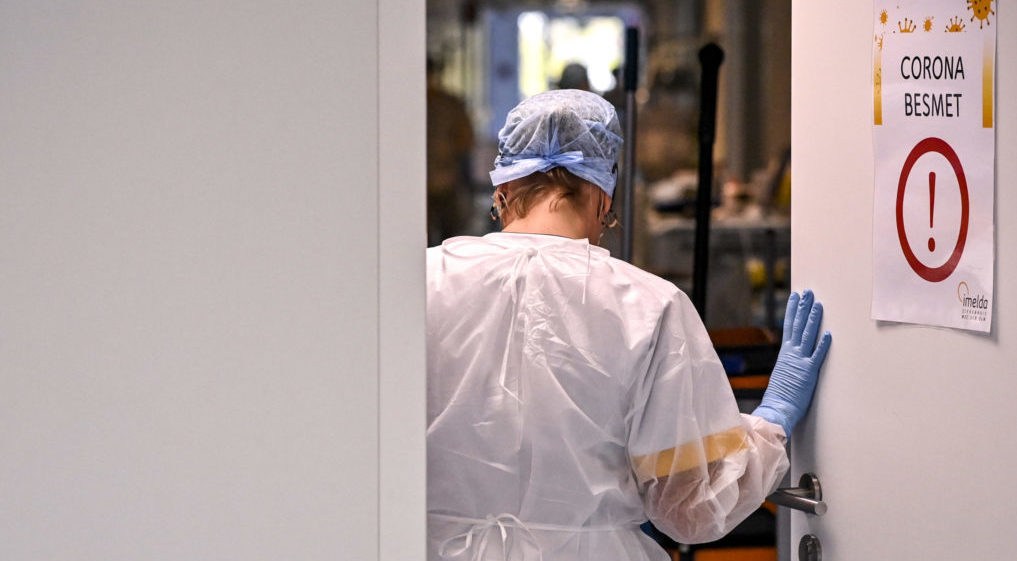The arrival of monkeypox cases in Europe and Belgium has caused concern among many, as two years of the Covid-19 pandemic has left scars on the world’s entire population.
However, the monkeypox virus is not as concerning as Covid-19, experts told VRT, as the two diseases have little in common.
These are the five most significant differences between the two viruses:
1. More visibility
Covid-19 was often invisible; not everyone who is infected shows symptoms, but can still spread it to others. In addition, symptoms were similar to those of a common cold or flu.
Monkeypox always brings symptoms with it, being fever, headaches, muscle aches, chills, and exhaustion. It can finally result in "pox" on the skin, making it a lot easier to detect.
Virologist Marc Van Ranst explains which types of sores can be symptoms of monkeypox:
Deze foto toont het verloop van de apenpokken-letseltjes. Mensen die bij zichzelf letsels zoals op deze foto herkennen, kunnen best contact opnemen met hun arts pic.twitter.com/cNOzl6qI9X
— Marc Van Ranst (@vanranstmarc) May 20, 2022
2. Slower transmission
While Covid-19 spread through little droplets in the air, making it very contagious, monkeypox only spreads through bigger drops.
“These are large droplets, not comparable to Covid-19, where there is a kind of mist over the different variants,” explains immunologist Pierre Van Damme.
Isolation is therefore a very effective means of slowing down the spread of the virus. However, materials can also be a source of contamination, for instance bed linen that have been in contact with the blisters.
It is also not the first time monkeypox occurs in our region, as Europe and America have already experienced several outbreaks, which died out on their own.
Covid-19, on the other hand, was a completely unique virus, of which only “distant relatives” were known to scientists. The lack of information made it harder to combat the virus.
3. Existing vaccines
We are partially protected already thanks to the smallpox vaccine, an earlier epidemic that turned out to be very deadly, also protects against monkeypox.
Most people born before the early 1970s were vaccinated against smallpox, which completely eradicated the virus. It is therefore not as much of a concern to the elderly as Covid-19 was.
Meanwhile, there already is a vaccine for monkeypox that has been developed for medical teams travelling to affected regions. It is currently not produced at a large scale and experts predict that this will not be necessary.
A direct antiviral treatment does not yet exist, though it is being developed. Current patients are advised to maintain good wound hygiene to avoid additional infections.
4. Different context
The mortality rates of the virus is 1 to 11% based on worldwide, according to the World Health Organisation.
However, there are two different strains of the virus - the Central and West African strain, of which the West African variant has a lower mortality. The cases present in Europe belong to the latter strain, explains Isabel Brosius from the Instituted for Tropical Medicine in Laat.
In addition, health care tends to be less accessible in those regions, and it is likely that only the most serious cases are noted.
Moreover, Van Damme explains that people in Central and West Africa also have high mortality rates from pneumonia, a disease that is usually easily treatable in Europe.
Related News
- 'Viruses don't discriminate': Expert outraged by homophobic reactions to monkeypox
- Fourth monkeypox case identified in Belgium, more expected
- Monkeypox patients must spend 21 days in isolation
Thanks to better wound hygiene, earlier recognition of the disease and a different medical background of people, the virus seems to be more easily treatable in Europe. “In 2003 there were 70 cases in America, but those were all mild cases,” Van Damme adds.
5. Milder consequences
Though monkeypox symptoms are irritating and the virus requires 21 days in isolation, the consequences of monkeypox are also milder.
Fortunately, it is known that monkeypox has no long-term consequences for those who catch it. For Covid-19, the long-term effects remained unknown for a while, after which 'long Covid' was diagnosed.
An estimated one in seven Covid-19 patients still suffers from complaints after six months, including severe fatigue and sometimes even “brain fog” and permanent loss of smell and taste.
There are no indications of long-term complaints with monkey pox, except for the sores potentially leading to scars when treated incorrectly.
In a Rapid Risk Assessment published on Monday, the European Centre for Disease Prevention and Control (ECDC) wrote that a total of 67 cases of monkeypox acquired in the EU have been reported in nine EU Member States (Austria, Belgium, France, Germany, Italy, Netherlands, Portugal, Spain, Sweden).
ECDC recommends EU/EEA countries focus on prompt identification, management, contact tracing and reporting of new monkeypox cases. “Most of the current cases have presented with mild disease symptoms, and for the broader population, the likelihood of spread is very low,” said Andrea Ammon, ECDC Director.

